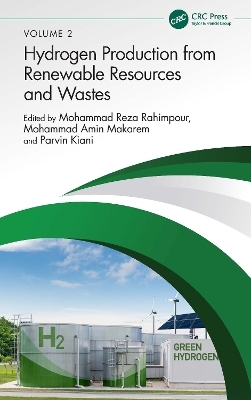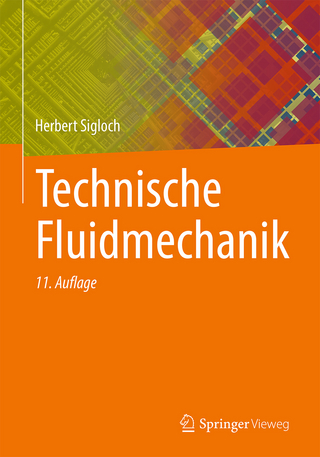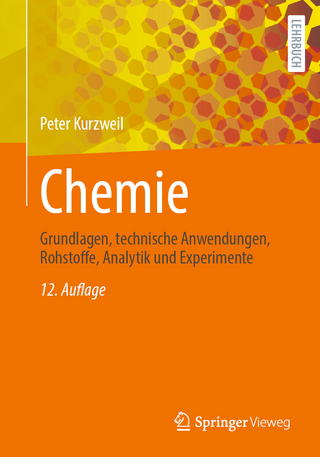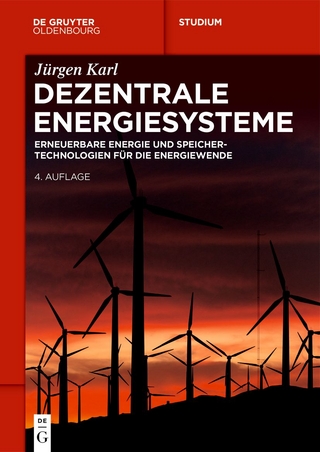
Hydrogen Production from Renewable Resources and Wastes
CRC Press (Verlag)
978-1-032-46560-9 (ISBN)
- Lieferbar (Termin unbekannt)
- Versandkostenfrei innerhalb Deutschlands
- Auch auf Rechnung
- Verfügbarkeit in der Filiale vor Ort prüfen
- Artikel merken
This book provides readers with a comprehensive overview of the processes and technologies utilized for producing hydrogen from renewable sources. It discusses common methods like gasification, pyrolysis, and liquefaction, along with novel methods like water thermochemical splitting, biophotolysis, biological water‑gas shift reaction, and fermentation processing. The application of various renewable sources, including wind, solar, and geothermal energy, is covered in detail.
Introduces water splitting conversion processes for hydrogen production in detail
Uniquely provides different pyrolysis, gasification, and liquefaction processes for hydrogen generation
Covers different biomass and waste sources for producing hydrogen
Discusses biochemical methods for converting biomass to hydrogen
Provides the application of renewable energy sources in hydrogen production
Part of the multivolume Handbook of Hydrogen Production and Applications, this standalone book guides researchers and academics in chemical, environmental, energy, and related areas of engineering interested in the development and implementation of hydrogen production technologies.
Mohammad Reza Rahimpour is a Distinguished Professor of Chemical Engineering at Shiraz University, Iran. He earned a PhD in chemical engineering at Shiraz University, in collaboration with the University of Sydney, Australia, in 1988. He leads a pioneering research group specializing in fuel processing technology, with a particular focus on the catalytic conversion of both fossil fuels, such as natural gas, and renewable fuels, like bio‑oils derived from lignin, into valuable energy sources. Throughout his academic career, Dr. Rahimpour has specialized in hydrogen production technologies, including steam methane reforming, water electrolysis, photocatalytic hydrogen production, and hydrogen production from both renewable sources and fossil fuels. His extensive expertise and innovative research significantly contribute to advancements in hydrogen production and its practical applications. Mohammad Amin Makarem earned a PhD in chemical engineering at Shiraz University. His research interests include gas separation and purification, nanofluids, microfluidics, catalyst synthesis, reactor design, and green energy. Parvin Kiani earned a degree in chemical engineering at Shiraz University. Her research has focused on gas separation, clean energy, and catalyst synthesis.
Section I: Water Splitting Conversion Processes. 1. Hydrogen Production through Electrolysis. 2. Hydrogen Production from Water Thermochemical Splitting. Section II: Biomass and Wastes Thermochemical Conversion Processes. 3. Pyrolysis Process for Conversion of Lignin to Hydrogen. 4. Pyrolysis Process for Conversion of Sewage Sludge to Hydrogen. 5. Pyrolysis of Municipal Biomass Wastes for Hydrogen Production. 6. Gasification of Lignin for Hydrogen Production. 7. Gasification of Sewage Sludge for Hydrogen Production. 8. Liquefaction of Algal Material for Hydrogen Production. Section III: Biomass Biochemical Conversion Processes. 9. Biophotolysis Process for Biomass Conversion to Hydrogen. 10. Biological Water‑Gas Shift Reaction Process for Hydrogen Production. 11. The Fermentation Process for Biomass Conversion to Hydrogen. Section IV: Other Renewable Resources for Hydrogen Production. 12. Application of Solar Energy in Hydrogen Production. 13. Application of Hydropower Energy in Hydrogen Production: Tide, Wave, Water Flow, and Fall. 14. Application of Geothermal Energy in Hydrogen Production.
| Erscheinungsdatum | 25.09.2024 |
|---|---|
| Zusatzinfo | 30 Tables, black and white; 12 Line drawings, black and white; 81 Halftones, black and white; 93 Illustrations, black and white |
| Verlagsort | London |
| Sprache | englisch |
| Maße | 156 x 234 mm |
| Gewicht | 840 g |
| Themenwelt | Naturwissenschaften ► Chemie ► Technische Chemie |
| Naturwissenschaften ► Physik / Astronomie | |
| Technik ► Elektrotechnik / Energietechnik | |
| Technik ► Umwelttechnik / Biotechnologie | |
| ISBN-10 | 1-032-46560-3 / 1032465603 |
| ISBN-13 | 978-1-032-46560-9 / 9781032465609 |
| Zustand | Neuware |
| Informationen gemäß Produktsicherheitsverordnung (GPSR) | |
| Haben Sie eine Frage zum Produkt? |
aus dem Bereich


